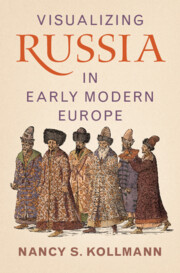
- Publisher:
- Cambridge University Press
- Online publication date:
- August 2024
- Print publication year:
- 2024
- Online ISBN:
- 9781009418690

In early modern Europe, the emergence and development of print culture proved a powerful new method for producing and disseminating knowledge of Russia through visual means. By examining the images of Russia found in travel accounts, pamphlets, maps and costume books, this study demonstrates how the visual shaped a dual understanding of these lands: Russia and Russians were portrayed as familiar, but the steppe and forest frontiers were seen as forbidding and exotic. As these images were reproduced and plagiarized in new formats, so too were their meanings – the idea of Russia was one which constantly shifted across genres, usages, and audiences. Nancy Kollmann examines the techniques harnessed by artists and publishers to suggest the authenticity of their publications, and explores in turn how these complex depictions of Russia contributed to Europeans' understanding of themselves.
‘For nearly two hundred years West Europeans had a collection of images of a society both familiar and different, a familiarity reinforced by the images of the much more alien forest and steppe peoples of Russia’s frontiers. Nancy Kollmann shows how extensively these images circulated, and how their use says as much about the European print market as it does about Russia. That conclusion is an important correction to the common idea that European accounts of Russia and the accompanying images are nothing more than the construction of an image of an exotic neighbor.’
Paul Bushkovitch - Yale University
‘In this innovative study, Nancy Kollmann enhances our understanding of Western knowledge of Muscovy by examining not only the printed texts of travellers’ accounts, but also the illustrations that accompanied them. The book will be of great interest to historians of European publishing as well as to Russianists.’
Maureen Perrie - University of Birmingham
‘Moving between sumptuous courts and inky printshops, Visualizing Russia in Early Modern Europe tells the engaging story of an ocular relationship, a way of seeing, that connects two close yet distant neighbors. With Nancy Kollmann’s expert guidance, we learn not only how Europe saw Russia but even more how Europeans saw themselves during a momentous and changing time.’
Willard Sunderland - University of Cincinnati
 Loading metrics...
Loading metrics...
* Views captured on Cambridge Core between #date#. This data will be updated every 24 hours.
Usage data cannot currently be displayed.